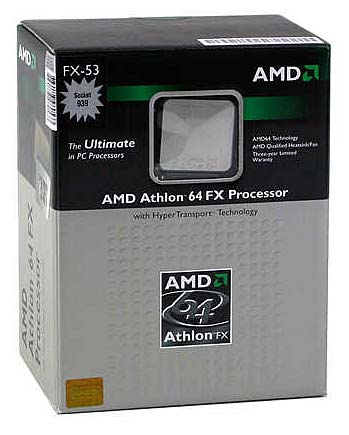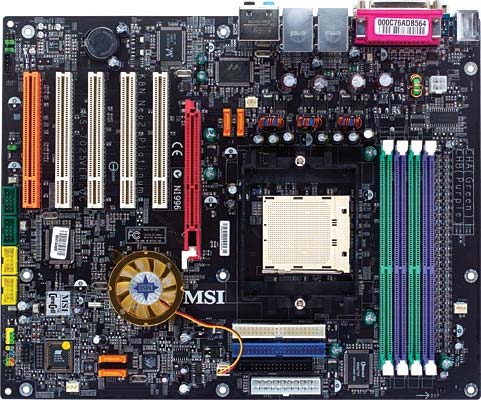Buyer's Guide: High End System - July 2004
by Wesley Fink on June 30, 2004 12:00 PM EST- Posted in
- Guides
CPU and Motherboard Recommendations
CPU: AMD Athlon 64 FX53 1MB L2 cache (2.4GHz) - SOCKET 939Motherboard: MSI K8N Neo2 - SOCKET 939
Price: CPU - $829 shipped (retail heatsink and fan). Motherboard - $170 shipped

With Intel's recent introduction of Socket 775 came a new 560 Pentium 4, which runs at 3.6GHz. While the 560 is closer in performance than the previous 3.4GHz P4 or the 3.4EE, the FX53 is still the top-performing CPU. Furthermore, all current Pentium 4 processors can only run 32-bit code, so AMD's Athlon 64 is unique because it can run 32-bit code as well or better than the top competition in addition to 64-bit code for the future. All-in-all, the FX53 represents a good choice if you are building a high-end system today, whether in the newest Socket 939 or the older Socket 940.
This month also saw the introduction of FX53 in the new Socket 939. Socket 939 processors are available, but the motherboards are just starting to ship and are still very difficult to find. This should improve over the next couple of weeks. AMD increased the price of both the 940 and 939 versions of FX53 when Socket 939 was introduced, so both the new 939 and older 940 FX53 versions are more expensive than last month's Socket 940 FX53.
We chose Socket 939 for the future, since this appears to be AMD's primary socket moving forward. Socket 939 also has the added feature of being able to use any of a very wide selection of commonly available unbuffered DDR memory, instead of the harder to find and more expensive registered DDR required by Socket 940 motherboards..
If you have a difficult time finding the Socket 939 selections, you will get almost identical performance at almost the same cost with last month's selection of the Asus SK8V motherboard, the socket 940 FX53, and OCZ DDR433 Registered DDR memory. These selections are proven performers and are only very slightly slower than the Socket 939 in any benchmark. Both the Asus SK8V 940 and our new MSI K8N Neo2 feature adjustable multipliers, so the processor frequency can be adjusted up and down for those who want to squeeze a bit more from the processor. Both Socket 940 and Socket 939 are also Dual-Channel memory, so the differences in performance are very small.

We broke our own rule a bit to select the excellent MSI K8N Neo2 as the motherboard for our top system. The K8N Neo2 is expected to start appearing in the retail channel this week and we were very impressed with the performance in our Socket 939 launch review. The MSI K8N Neo2 also has the added flexibility of a working PCI/AGP lock if your high end interests include overclocking, a feature not available on the Asus SK8V.
The MSI provides everything that you would expect in a high end motherboard for the Athlon 64. The chipset is the much-updated nForce3-250 Ultra, which features 1000 HyperTransport speed capabilities. You can populate it with up to 4GB of Dual-Channel DDR memory, and the board also has the advantage of the on-chip nVidia Gigabit LAN, which moves high-speed LAN off the PCI bus. There is also a second Gigabit LAN connection on the K8N Neo2. MSI also supports nVidia's excellent "any-drive" RAID technology, which allows up to 4 IDE drives and 4 SATA drives to be combined in any RAID configuration. Support is also included for up to 8 USB devices and 3 Firewire devices.
The K8N Neo2 is also a Core Cell board with excellent adjustments for overclocking control, but also with simple automatic overclocking for those intimidated by manual adjustments. MSI has done a great job of integrating these "Core Center" functions, so you can have complete manual control of the board as well if that is your preference.

AMD also introduced a 3800+ Socket 939 processor with half the cache at a price of about $80 lower. However, if price is a concern, we would suggest going for the 3500+ at about $500 instead. Just keep in mind that while all AMD Athlon 64 processors can be adjusted to lower multipliers, only the FX CPU is completely unlocked.
Listed below is part of our RealTime pricing engine, which lists the lowest prices available on the AMD CPUs and motherboards from many different reputable vendors:
If you cannot find the lowest prices on the products that we've recommended on this page, it's because we don't list some of them in our RealTime pricing engine. Until we do, we suggest that you do an independent search online at the various vendors' web sites. Just pick and choose where you want to buy your products by looking for a vendor located under the "Vendor" heading.










49 Comments
View All Comments
kd4yum - Thursday, July 8, 2004 - link
Well! I guess so!regarding comment 28....
Now wait a minute. Why would RAID 0 cut the MTBF in half? Is this dice we are rolling?
Probably, the splay of i/o across mult disks would relax the work on the actuator arms.
'specially if 'elevator queueing' is active.
And don't forget about reduced fragmentation.
No, I think you'd get your 100K hours with either RAID 0 or RAID 1. It would just hirt more with RAID 0. my $0.02
kd4yum - Thursday, July 8, 2004 - link
Let's see. Do I still have a valid uname and passwd? uhhhthe5thgeek - Wednesday, July 7, 2004 - link
Ok my bad, it is not on the U.S. version of the msi web site. thanks!Wesley Fink - Wednesday, July 7, 2004 - link
#32 -The board is definitely on MSI's web bite at http://www.msi.com.tw/program/support/download/dld...It even has BIOS and drivers posted. MSI assured us the board would be available beginning last week, so it should be available very soon.
#33 - There will be an Overclocking Guide later this month. With all of the massive changes in Sockets, Chipsets, and Hardware, we decided to delay the overclocking guide until the new hardware was released and could be tested.
lazerasa - Tuesday, July 6, 2004 - link
what happened to the overclock system buyers guide? there hasn't been one in 3 months...?the5thgeek - Tuesday, July 6, 2004 - link
Why are you recomending a motherboard that does not exist? (at least for us poor mortals that must deal in the real world[that board is not even on MSI's web site, much less available retail])warath - Sunday, July 4, 2004 - link
I find it funny that in one article you recommend RAID-0, and in another, you say NOT EVEN Close to worth it :P :) Make up your minds Anandtech!TrogdorJW - Thursday, July 1, 2004 - link
Regarding RAID 0, it really isn't as "useless" as the other article portrays, depending on what you do with it. If you only play games and surf the web, then it certainly isn't that big of a deal. If you routinely copy files around on your hard drive (i.e. either compressing or extracting from archives), or in compiling code, there is a somewhat noticeable improvement in speed. There is also a definite improvement in performance when multitasking with a hard-drive intense operation running in the background. For example, try copying a file from one drive to another drive while surfing the web with and without RAID 0. It's something I do periodically, and I definitely notice an improvement. Video editing definitely benefits from the added hard drive performance.Maybe it's not worth the extra cost, but I really don't like dealing with three hard drive letters much. I have one drive setup as my C: drive, and then two drives striped as drive D:. So I have a 320 GB D: partition and a 120 GB C: partition. The cost of the D: partition was about $230 - only slightly more than a single 74 GB Raptor. Of course, I don't store any critical files on the RAID 0 array - it's all stuff that I would only be moderately irritated at having to reinstall.
Z80 - Thursday, July 1, 2004 - link
Regarding the MSI motherboard recommendation:"A hardware and software service company from Vermont filed a legal class-action suit against Microstar International accusing one of the leading mainboard makers in the world of intentionally using low-quality components on its mainboards. A report from Reuters claims that the suit, filed in Los Angeles Superior Court last Thursday by Electronic Connection Services Corporation claims that MSI has knowingly used capacitors, devices used to regulate the power supply to microchips, that can leak or even explode and cause mainboards to short-circuit. The suit, which seeks to cover any person or company in the United States who has made a wholesale or retail purchase of an MSI mainboard since 1999, seeks unspecified damages and restitution and other relief."
I wonder if I can get any money back for those two crappy MSI MB's I got stuck with!
qooleot - Thursday, July 1, 2004 - link
Ya..I was gonna say the same thing...In one article today you guys write:
If you haven't gotten the hint by now, we'll spell it out for you: there is no place, and no need for a RAID-0 array on a desktop computer. The real world performance increases are negligible at best and the reduction in reliability, thanks to a halving of the mean time between failure, makes RAID-0 far from worth it on the desktop.
And in another article:
Recommended: Dual Western Digital Raptor 74GB 10,000RPM SATA in RAID 0 Configuration
I guess you guys haven't gotten the hint by now...